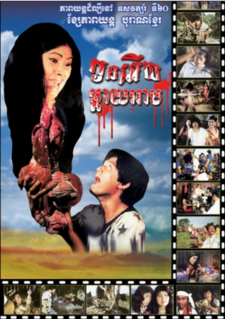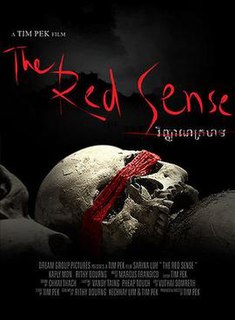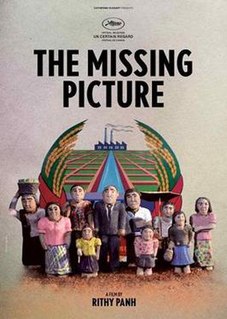
The Krasue, known as Ahp in Cambodia; as Kasu in Laos; as Kuyang, Leak, Pelasik, Pelesit, or Penanggalan in Indonesia; as Penanggal in Malaysia, Indonesia, Brunei and Singapore; as Manananggal in the Philippines; as Ma lai in Vietnam; is a nocturnal female spirit of Southeast Asian folklore. It manifests itself as a woman, usually young and beautiful, with her internal organs hanging down from the neck, trailing below the head.

Cinema in Cambodia began in the 1950s, and many films were being screened in theaters throughout the country by the 1960s, which are regarded as the "golden age". After a near-disappearance during the Khmer Rouge regime, competition from video and television has meant that the Cambodian film industry is a small one.

Media in Cambodia is vibrant and largely unregulated. This situation has led to the establishment of numerous radio, television and print media outlets. Many private sector companies have moved into the media sector, which represents a significant change from many years of state-run broadcasting and publishing.

Rice People is a 1994 Cambodian drama film directed and co-written by Rithy Panh. Adapted from the 1966 novel Ranjau Sepanjang Jalan, by Malaysian author Shahnon Ahmad, which is set in the Malaysian state of Kedah, Rice People is the story of a rural family in post-Khmer Rouge Cambodia, struggling to bring in a single season's rice crop. It was filmed in the Cambodian village of Kamreang, in the Kien Svay and Boeung Thom areas of Kandal Province near Phnom Penh, on the banks of the Mekong River. The cast features both professional and non-professional actors.
Tep Rindaro is a Cambodian actor and singer. He started acting in 1987. With his career spanning more over 30 years, he is one of the longest starring actors in Cambodia since the fall of the Khmer Rouge in 1979.

My Mother Is Arb is a Cambodian horror film.

The Red Sense is a 2006 Khmer-Australian supernatural thriller film. It was director Tim Pek's debut film and was produced by Transparent Pictures. The success of The Red Sense led Transparent Pictures to produce films such as Bokator and Annoyed. The Red Sense was first released in Australia in August 2008, and though banned for general release there, screened in Cambodia in December that year. It is rated M by the Office of Film and Literature Classification of Australia.
Horror films in Cambodia, first popular in the 1970s, have received renewed attention in Cambodian film making since the resurgence of the local industry in 2003. Horror is one of three popular genres into which most Cambodian films can be loosely grouped, the other two being period pieces and melodrama/romantic drama. The fledgling Cambodian industry of the mid 2000s looked to capitalize on the world-wide popularity of Japanese horror films which have heavily influenced Cambodian horror films. Common themes are ghost or spirit hauntings, possession, folk mythology and revenge by supernatural means. The storytelling takes a slower pace than Western horror and relies on suspense, a pervasive sense of doom and dread, and psychologically disturbing events and situations. Unlike its Japanese counterparts however, many Cambodian horror films also feature over the top gore as seen in Western horror.
Ampor Tevi is a Cambodian actress active in 1990s. Within the span of her career she has starred in numerous films, from movies to musical skits. Her career started in 1988 with her paired actor Sam Vityea. After Sam Vityea died that year, Ampor Tevi was often paired with fellow actor, also famous at the time, Tep Rindaro.
This is an incomplete, chronological list of films produced in the Khmer language in the 2000s.

The Missing Picture is a 2013 Cambodian-French documentary film directed by Rithy Panh about the Khmer Rouge. It was screened in the Un Certain Regard section at the 2013 Cannes Film Festival where it won the top prize. It was also screened in the World Cinema section at the 2013 Cinemanila International Film Festival where it won the Grand Jury Prize. It won the Lumières Award for Best Documentary at the 21st Lumières Awards and was nominated for the César Award for Best Documentary Film at the 41st César Awards.
The Bophana Center is an audiovisual center located in Phnom Penh, Cambodia. The center is dedicated to restoring, protecting and enhancing the Cambodian audiovisual heritage.

First They Killed My Father is a 2017 Cambodian–American Khmer-language biographical historical thriller film directed by Angelina Jolie and written by Jolie and Loung Ung, based on Ung's memoir of the same name. Set in 1975, the film depicts 7-year-old Loung, who is forced to be trained as a child soldier while her siblings are sent to labor camps during the Khmer Rouge regime.
This page is based on this
Wikipedia article Text is available under the
CC BY-SA 4.0 license; additional terms may apply.
Images, videos and audio are available under their respective licenses.







